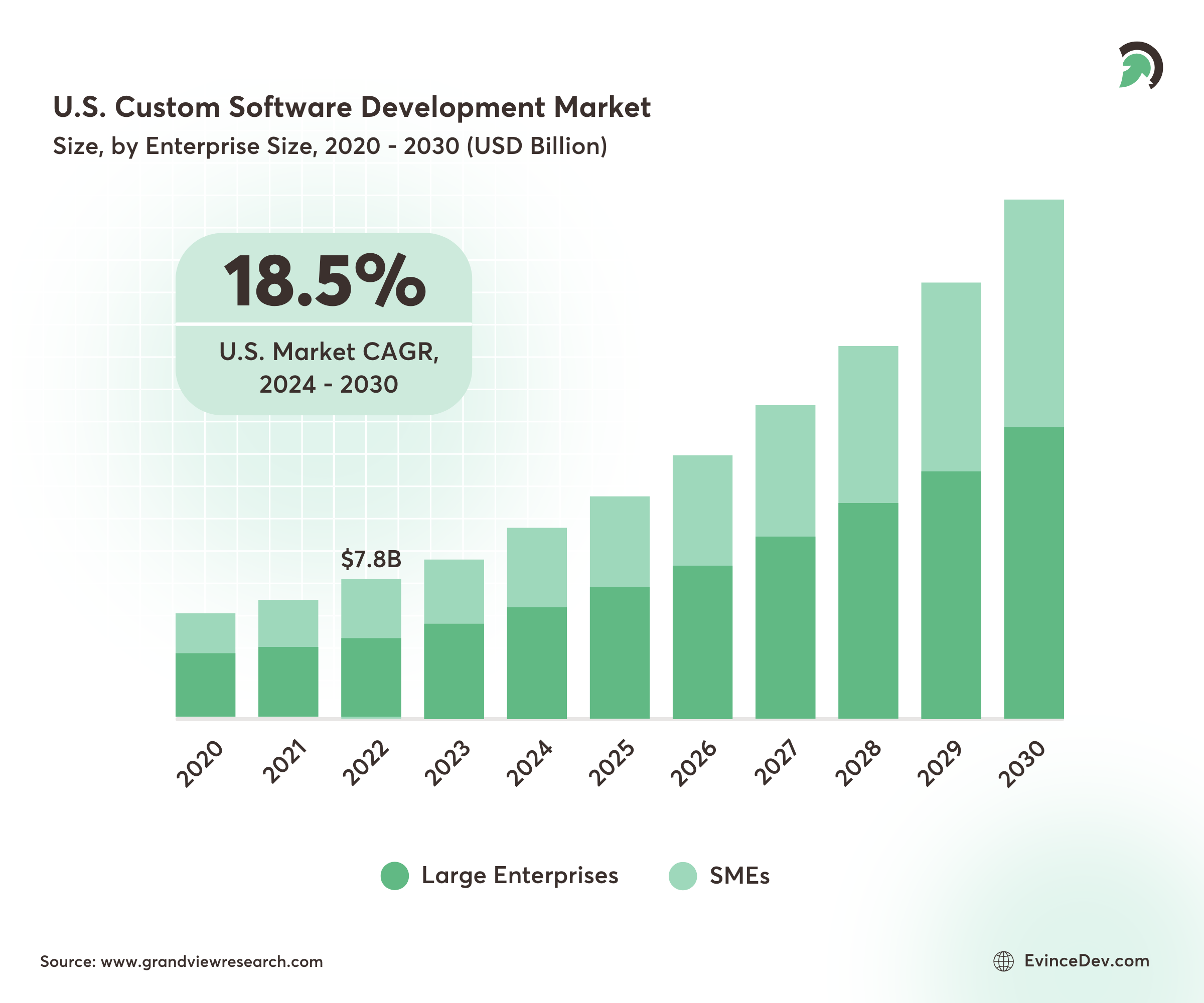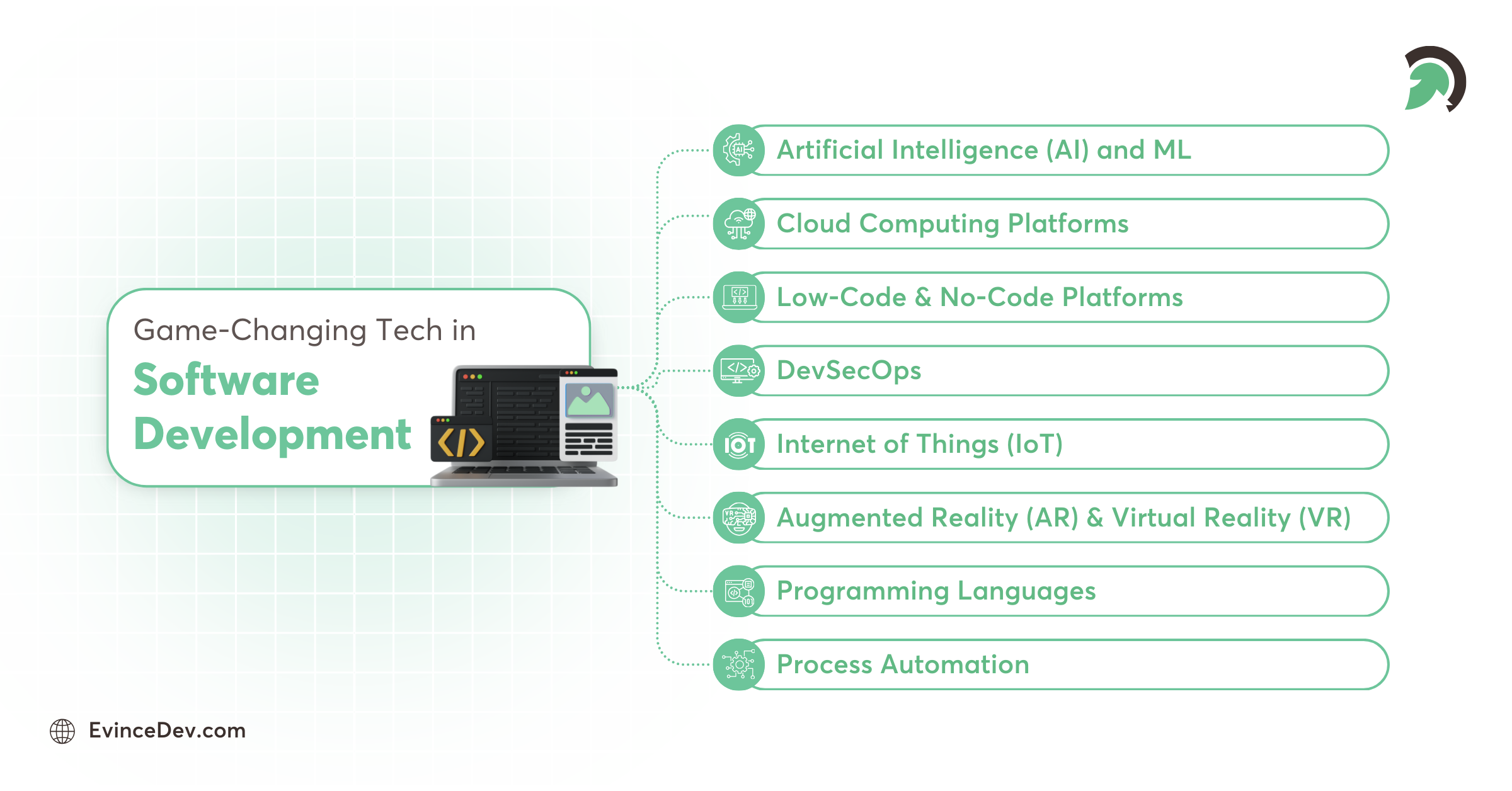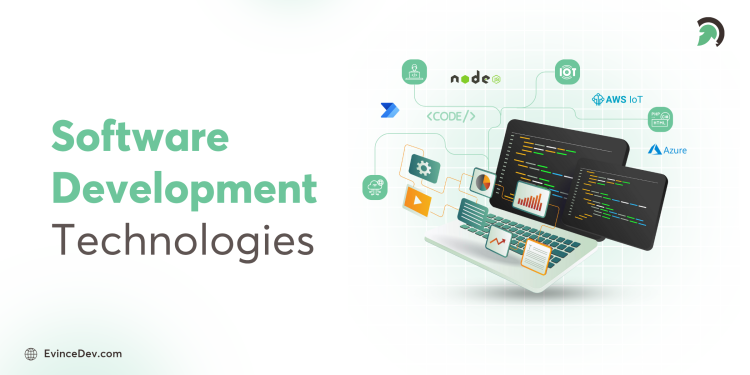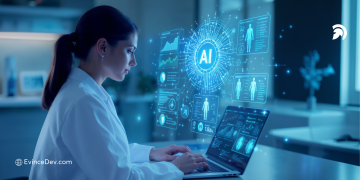In the dynamic world of technology, businesses rely on custom software development to stay competitive and efficient.
According to the study by Grand View Research, the global custom software development market was valued at USD 29.29 billion in 2022 and is expected to expand at a compound annual growth rate (CAGR) of 22.4% from 2023 to 2030.

Breaking Down the Key Software Development Technologies Shaping
Artificial Intelligence (AI) and Machine Learning (ML)
Artificial Intelligence (AI) and Machine Learning (ML) AI and ML are transforming the software landscape by enabling more innovative applications that can learn and adapt. AI-powered tools automate repetitive tasks, enhance predictive analytics, and improve decision-making processes. Machine learning models are integrated into custom software development to process large datasets and provide actionable insights.
Advantages
- Automates complex and repetitive tasks, saving time and resources.
- Enhances data-driven decision-making with predictive analytics and pattern recognition.
- Improves customer experience through personalized interactions and recommendations.
Key Considerations for Implementing AI and ML
- Data Quality and Availability: Success of AI and ML heavily relies on high-quality, structured, and relevant data. Data accuracy, completeness, and availability are critical for building reliable models that yield actionable insights.
- Algorithm Selection: Choosing the right algorithm for your specific use case is essential. Factors like dataset size, complexity, and desired outcomes influence which machine learning model or AI approach will perform optimally.
- Scalability and Infrastructure: Implementing AI and ML requires robust infrastructure to handle computational demands. Cloud platforms and scalable architectures ensure your solutions can grow with increasing data and usage.
- Ethics and Bias Mitigation: Ethical considerations, including data privacy and bias reduction, are crucial in AI and ML projects. Establishing guidelines and testing for fairness ensures that models operate transparently and responsibly.
Cloud Computing Platforms
Cloud computing platforms like AWS, Microsoft Azure, and Google Cloud have revolutionized software development. These platforms provide scalable infrastructure, enabling businesses to host applications and store data efficiently. Cloud-based tools support seamless collaboration among development teams, facilitating faster development cycles.
Containerization tools like Docker and Kubernetes further enhance cloud-native development.
Advantages
- Offers scalability and cost-efficiency for businesses of all sizes.
- Ensures high availability and disaster recovery capabilities.
- Enables global collaboration with real-time access to resources.

Key Considerations for Implementing Cloud Computing Platforms
- Choosing the Right Provider: Selecting a cloud provider, such as AWS, Microsoft Azure, or Google Cloud, depends on your business needs. Consider pricing, performance, security features, and available services to ensure the platform aligns with your goals.
- Data Security and Compliance: Implement robust security measures, including encryption, access controls, and regular audits. Additionally, compliance with industry-specific regulations like GDPR or HIPAA should be ensured to protect sensitive data and avoid legal issues.
- Cost Management and Optimization: Cloud services can become costly if not managed effectively. Regularly monitor usage, leverage cost-saving options like reserved instances, and use tools for cost optimization to avoid overspending.
Low-Code and No-Code Platforms
Low-code and no-code platforms empower users without extensive coding expertise to build functional applications. These platforms provide drag-and-drop interfaces and pre-configured components, significantly reducing development time. They are ideal for rapid prototyping and small-scale custom software development projects, enabling businesses to adapt to market demands quickly.
Advantages
- Speeds up development, reducing time-to-market.
- Lowers development costs by minimizing the need for skilled developers.
- Enables non-technical users to participate in application creation.
Key Considerations for Implementing Low-Code and No-Code Platforms
- Identifying Suitable Use Cases: Determine which projects best suit low-code or no-code development. These platforms are ideal for internal tools, prototypes, or small-scale applications but may not fit highly complex or enterprise-grade solutions.
- Assessing Platform Capabilities: Evaluate the platform’s features, scalability, and integration options. Ensure it supports your required functionalities, such as APIs, third-party tools, and database compatibility, to avoid limitations during development.
- Ensuring Governance and Security: Establish clear guidelines to manage user access and data security. Low-code platforms should include robust security features, compliance capabilities, and monitoring tools to mitigate risks associated with rapid development.
- Balancing Customization and Simplicity: While low-code platforms simplify development, ensure they allow sufficient customization to meet your business needs. Assess whether the platform can accommodate advanced features or integrate with other systems if required.
DevSecOps
Building on the DevOps philosophy, DevSecOps integrates security practices directly into the development lifecycle. It ensures that security is a continuous priority rather than an afterthought. By embedding security checks into automated pipelines, teams can detect vulnerabilities early and remediate them quickly.

Advantages
- Strengthens overall security posture by identifying issues early.
- Reduces risks associated with security breaches and vulnerabilities.
- Promotes a culture of shared responsibility among development, security, and operations teams.
Key Considerations:
- Early Integration: Incorporate security measures from the start of the development process.
- Automation: Leverage automated security testing and monitoring tools.
- Compliance: Ensure adherence to relevant industry standards and regulations.
- Cultural Shift: Foster collaboration between traditionally siloed teams to build a security-first mindset.
Internet of Things (IoT)
IoT connects devices, enabling real-time data exchange and smarter environments. Software development for IoT requires robust technologies that ensure seamless communication between devices. Frameworks like Node.js and platforms like Google IoT Core facilitate the creation of scalable IoT applications. IoT-driven solutions are essential in healthcare, manufacturing, and smart cities.
Advantages
- Enables real-time monitoring and control of devices.
- Enhances operational efficiency through automation and data insights.
- Creates opportunities for innovative smart solutions across industries.
Augmented Reality (AR) and Virtual Reality (VR)
Augmented Reality (AR) and Virtual Reality (VR) AR and VR technologies transform user experiences by offering immersive environments. These technologies are widely used in gaming, education, and real estate applications. Frameworks like Unity and Unreal Engine provide developers with the tools to create engaging AR and VR applications. Custom software development leverages AR/VR to enhance user engagement.

Advantages
- Offers immersive and interactive experiences for users.
- Enhances training and learning through virtual simulations.
- Boosts customer engagement in industries like retail and real estate.
Programming Languages Driving Software Development
Programming languages remain at the core of software development technologies. Python leads in AI and data science projects due to its simplicity and rich library ecosystem. JavaScript dominates web development with its versatility in front-end and back-end frameworks. Emerging languages like Rust and Kotlin are gaining popularity for their performance and developer-friendly syntax.
Advantages
- Enables the creation of versatile and scalable software solutions.
- Provides specialized features for specific domains like AI, web, and system programming.
- Promotes innovation with active developer communities and support.
API-First Development
API-First development is a modern approach in which APIs are designed and developed before the application. This methodology ensures seamless integration, flexibility, and scalability across platforms, enabling efficient communication between services and applications.
Advantages
- Encourages modular and scalable software architecture.
- Enhances interoperability by allowing different applications to communicate efficiently.
- Speeds up development by enabling teams to work on front-end and back-end simultaneously.
Key Considerations for Implementing API-First Development
- Design First Approach: APIs should be well-documented and follow standards like REST, GraphQL, or gRPC to ensure usability.
- Security and Authentication: Implement OAuth, JWT, or API gateways to manage access and prevent unauthorized use.
- Versioning and Maintenance: APIs should be versioned properly to ensure backward compatibility and long-term usability.
- Performance Optimization: API response times should be optimized with caching, pagination, and efficient data retrieval strategies.
Process Automation
Process Automation leverages technology to automate repetitive business processes, freeing up human resources for higher-value tasks. By integrating automation tools, companies can streamline workflows, reduce operational errors, and improve efficiency.
Advantages
- Increased Efficiency: Automates routine tasks, reducing manual effort and accelerating process execution.
- Cost Reduction: Minimizes operational costs by reducing the need for manual intervention.
- Consistency: Ensures uniformity in processes, leading to more reliable outcomes.
Key Considerations
- Process Analysis: Map out and analyze existing workflows to identify automation opportunities.
- Tool Selection: Choose the right automation tools that integrate well with current systems.
- Change Management: Prepare the organization for workflow changes through training and communication.
- Continuous Improvement: Monitor automated processes and adjust to maintain optimal performance.
AI-Powered Software Development Tools
AI-powered development tools are revolutionizing the software engineering by automating code generation, debugging, testing, and optimization. These tools enhance developer productivity and reduce manual effort, leading to faster and more efficient software delivery.
Advantages
- Automates code completion and bug detection, reducing development time.
- Enhances software quality with AI-driven testing and debugging.
- Improves development efficiency through intelligent suggestions and auto-generated code snippets.
Key Considerations for Implementing AI-Powered Development Tools
- Integration with Existing Workflows: Ensure AI-powered tools complement the existing development environment without causing disruptions.
- Code Accuracy and Reliability: AI-generated code should be reviewed to maintain security, efficiency, and compliance with best practices.
- Security Risks and Compliance: AI tools should adhere to software security standards and regulatory requirements to prevent vulnerabilities.
- Continuous Learning and Adaptation: AI tools should be regularly updated with new data and algorithms to improve performance and accuracy.
WebAssembly (Wasm)
WebAssembly (Wasm) is a binary instruction format that enables high-performance execution of code on web browsers and other environments. It allows developers to run applications at near-native speed within the browser, making it ideal for performance-intensive applications such as gaming, simulations, and video processing.
Advantages
- Provides near-native performance on web applications.
- Enables multi-language support, allowing code written in languages like C, C++, and Rust to run in the browser.
- Enhances security with a sandboxed execution environment.
Key Considerations for Implementing WebAssembly
- Browser Compatibility: Ensure that the targeted browsers fully support WebAssembly features.
- Security Considerations: Although sandboxed, WebAssembly applications should be reviewed for potential vulnerabilities.
- Integration with JavaScript: Seamless interaction between WebAssembly and JavaScript is crucial for building efficient hybrid applications.
- Performance Optimization: Proper memory management and efficient compilation techniques should be applied to achieve the best performance.
Embracing the Future of Software Development
The future of software development lies in adopting innovative technologies, staying updated on software development trends, and leveraging robust tools. By understanding the software development lifecycle, businesses can deliver solutions that meet user expectations and market demands.
Partnering with a trusted company like EvinceDev ensures your projects benefit from experienced professionals and cutting-edge methodologies. As a leading software development company in USA, EvinceDev combines expertise with innovation to deliver scalable and efficient solutions tailored to your unique business requirements. It approach guarantees success in today’s competitive and evolving technological landscape.





